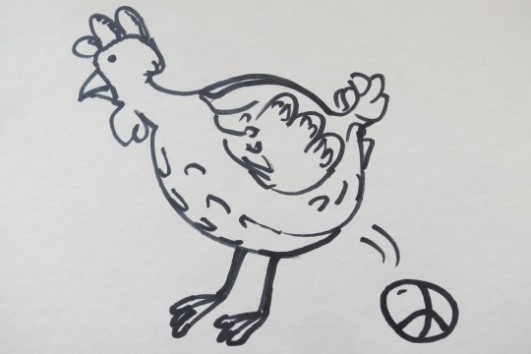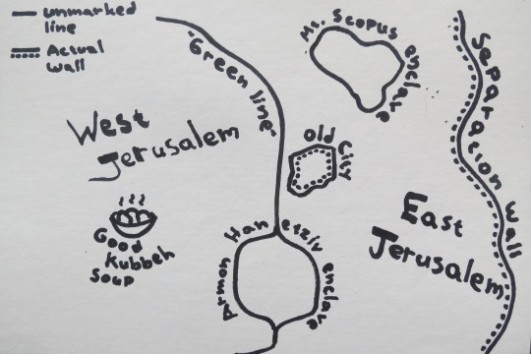When the going gets tough, the only way to move forward is to think differently. Following the disheartening drive from the South, the Lorde tribute project picks a new direction.
Part 12 of 15. To read the rest of the series, click here.
Friday was the last day of the rainy spell. The brave editor of this series, Mike Schaeffer Omer-Man, and Emily, his human rights lawyer wife, had us over for a hummus brunch in Jaffa. Beyond their apartment’s large French windows were the comely, winter-gray Mediterranean and something even grayer: a concrete ruin, an abandoned high rise that used to house offices of the customs authority.
I stood by those windows with a glass of Jaffa coffee, gazing at both grays with a spirit that wasn’t much more rainbow-like. “I’m giving up on the project,” I told Mike, “I rode all the way from the desert last night with Mira Awad. She convinced me that this isn’t a time for collaborations, not of this sort, at least. The situation has deteriorated too far. Anyone with any sense just wants to scream, and my project doesn’t qualify as a scream.”
He gave an understanding nod.
“I’m up to chapter 11 in the written account. Chapter 12 will be the last. I recorded one song with Yaron. We’ll find something to do with it.”
He nodded again. Did I want him to argue? To cause me to change my mind?
“Tomorrow I have a meeting with this vocal duo in Jerusalem, ‘The Djamchid Sisters.’ Yaron likes them. I’ll go and rehearse with them, but I’m not sure we’ll even record it. We’ll never be royals,” I coughed a bitter, pea-sized laugh, “we’ll never be on each other’s team, not until we reduce a little bit of the injustice here and calm some of the anger.” Mike knew all about that. You see a lot of it when you edit for +972. At times I even wondered whether he himself was somewhat offended by my jolly musical flight of fancy. “I mean, dude, I knew this was weird all along. I knew it. I just wanted to be the change I’d like to see in the world. Get it? Little acts of togetherness enable progress, but then, only progress enables them, but then, only they enable progress. It’s a chicken and egg thing. I just wanted to lay an egg.”
Mike is a softly spoken, contemplative guy. He contemplated, then said softly: “Okay, if that’s what you feel is right.”
Sum of its parts
It did feel right to me, but someone else disagreed, someone who has been following this project from the start, quietly but intently, someone whose need to scream these days is huge, who hurts at the sight of injustice perhaps worse than any of us. It was Ruthie, and on the way home, as we hopped over Herzl Street’s puddles, she convinced me not to give up. A crisis, she reminded me, is a crisis, and what leads out of crisis is a change of paradigm.
On the way to meet the Djamshid Sisters in Jerusalem, I strained my brain. How could I change my paradigm? What was wrong with my current paradigm? All I wanted was collaboration, friendship, union!
The sherut minibus began winding through the valleys, puffing its way up to the celestial city. I let go of my private brainstorm and checked my Facebook feed. Someone posted a picture of Shira onstage, wearing what looked like a dress my late Polish grandmother might own. I read the caption. The photo was taken at a concert featuring female Israeli singers who sang in the tongue of their ancestors. I’ve heard of such events before. They reflect the current identity explorations of the Israeli Left: showcasing the diversity of cultures brought here from the Jewish diasporas, and the failure of the crucible that was meant to melt them into one. Shira and her ‘Hazelnuts’ did an original Yiddish rendition of “Bie Mir Bist du Schein.”
Hold on.
I gave her a call. “Listen, I said. “The project is in flux. Mira Awad is out. Luna Abu Nassar is out. This Palestinian girl who is Lorde’s spitting image is out.”
“Really? Why?”
“Too complicated to explain, but I’m thinking of diversifying, of breaking the dichotomy and exploring identity on a different level. Let’s do that, and see if the Palestinians join in. Would you do ‘Team’ in Yiddish?”
Hers was the warmest “yes” I have heard since the whole journey began. Fantastic. In an hour I would be with the Djamchid Sisters. When we first met, at some Jerusalem event that Shira organized, I asked about their last name. They explained that is Iranian. Hebrew, Yiddish, Farsi… This could yet turn into something. I stepped off the Sherut in the center of West Jerusalem feeling fresh, and headed on foot to the Djamchids’ home, though it was a fair distance to the south, and east.
La Colonie
When I first suggested the project to Yaron, he proposed we record in the house of a friend who owned a piano. The house and the piano were both in the West Bank settlement of Alphe Menashe. “You are out of your mind!” I told him, “We are not recording a bi-national project in a settlement!”
Now here I was walking to one. Jerusalem’s Armon Hanatziv neighborhood is probably the most soft-core settlement of them all. It was built on what used to be a UN held enclave before the Six Day War. Nonetheless, according to international law it is just as illegal as any other. Its residents are Israeli citizens, unlike the Palestinians living on the surrounding hills, and their living conditions superior.
So be it, I thought. I was now out to meet the Israelis, and so many Israelis were drawn across the Green Line over the years, most often by the unthinkable cost of living. The Djamshid sisters may not even be aware of their neighborhood’s status. I grew up in a north-east Jerusalem settlement, and only came to realize that as a grown-up.
Armon Hanatziv is a peaceful puzzle of cookie-cutter developments tiled in Jerusalem stone, parking lots and pleasant public playgrounds. Shai-li and Eden Djamchid are in their early twenties and still live at home. An entire family welcomed me in its cute abode, and I got to taste two homemade cakes: a Hungarian yeast cake and a Napoleon. The sisters strained to listen as I explained the new concept with my mouth full. “So each artist will sing a song in a language that reflects their family’s history. You, for example, could sing in – ”
“French!” they both cheered.
How could I forget? The sisters may be half Persian, by they are French-Israeli on their mother’s side and total Francophiles. I was suddenly unsure. French is great, but is it as much a local language as Yiddish and Farsi are? Yiddish is uniquely Jewish, Farsi is Middle Eastern. French is… well… a lot of Israelis speak French, French Jews, and Moroccans, and fans of Godard from all backgrounds. It’s legit, yes, but is it legit enough for Royals? The biggest hit? I can’t hand Royals to the French!
I opened my mouth, about to bring up Farsi, then shut it. Here is one lesson my chain of disappointments has taught me: don’t decide people’s identity for them. I faintly raised the question of whether French was local or foreign, but soon brushed it away. Stop thinking you know better than anyone what this country is about, I told myself, and for the love of God, stop being so dominant and controlling. Fate had it that these two amazing musicians will sing Royals in French. For once, let fate have its way.
“Can you think of a translator?” I asked.
“Our mom,” Shai-li pointed to the living room sofa, where their mother’s eyes rose over her book, curious.
“There’s this singer,” I began, “from New Zealand…”
“No need for introductions,” Eden smiled, “Royals is her ring tone.”
(Part 12 of 15. For more, click here, or join us on Facebook! First clip is of the The Hazelnuts singing “Bie mir bistu schein”, in the second: the Djamchid sisters pay a tribute.)



